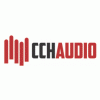As CCH Audio pointed out, what you're looking for is a Digital Audio Workstation (DAW).
I strongly disagree with the notion that any DAW is better in this or that than another, however. In utility, all DAWs are essentially equal. Anything you can do with your music in one DAW, you will be able to do in another. The difference lies entirely in usability (workflow), and included virtual instruments and samples.
MusicRadar has an article here that lists 19 decent DAWs. Most DAWs offer free trial or demo versions; so your best bet is getting your hands on some, and seeing which one works best for you.
For composing with virtual instruments, the DAW essentially serves as a platform that you load your virtual instrument plugins into. You then create, record, and edit MIDI tracks to play these instruments. Once you're set up with a DAW, you can mainly focus on getting more and better virtual instruments. EastWest/SoundsOnline for example has many great instruments that you will often hear in commercial productions.
If you have means of inputting and editing MIDI data that you don't need a DAW for (e.g., a MIDI-controller keyboard), you may not need a DAW, as many virtual instruments come with standalone players that typically let you record a wave file of what you're playing. So if you can run the digital signal through an analog mixer, you don't need the DAW as a platform. But I do recommend getting one for the flexibility it provides alone.
Another important thing to keep in mind is that virtual instruments that use extensive sample libraries require quite a lot of RAM, and can also peak your CPU usage. To not run into any headaches, I recommend at least 4GB of RAM and a decent processor. A dedicated hard drive at 7,200rpm (speed) is also recommended for the more extensive libraries (some of which actually come shipped on hard drives).
Happy composing! 










